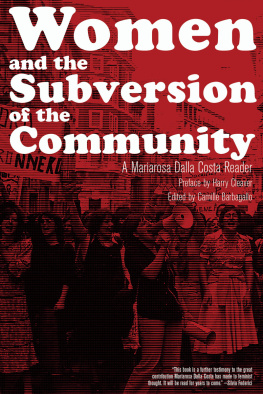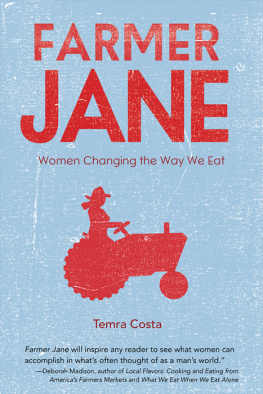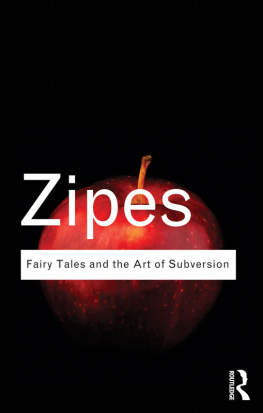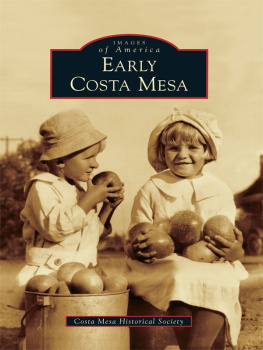Dalla Costa Mariarosa - Women and the Subversion of the Community
Here you can read online Dalla Costa Mariarosa - Women and the Subversion of the Community full text of the book (entire story) in english for free. Download pdf and epub, get meaning, cover and reviews about this ebook. year: 2019, publisher: PM Press, genre: Politics. Description of the work, (preface) as well as reviews are available. Best literature library LitArk.com created for fans of good reading and offers a wide selection of genres:
Romance novel
Science fiction
Adventure
Detective
Science
History
Home and family
Prose
Art
Politics
Computer
Non-fiction
Religion
Business
Children
Humor
Choose a favorite category and find really read worthwhile books. Enjoy immersion in the world of imagination, feel the emotions of the characters or learn something new for yourself, make an fascinating discovery.
- Book:Women and the Subversion of the Community
- Author:
- Publisher:PM Press
- Genre:
- Year:2019
- Rating:4 / 5
- Favourites:Add to favourites
- Your mark:
- 80
- 1
- 2
- 3
- 4
- 5
Women and the Subversion of the Community: summary, description and annotation
We offer to read an annotation, description, summary or preface (depends on what the author of the book "Women and the Subversion of the Community" wrote himself). If you haven't found the necessary information about the book — write in the comments, we will try to find it.
Women and the Subversion of the Community — read online for free the complete book (whole text) full work
Below is the text of the book, divided by pages. System saving the place of the last page read, allows you to conveniently read the book "Women and the Subversion of the Community" online for free, without having to search again every time where you left off. Put a bookmark, and you can go to the page where you finished reading at any time.
Font size:
Interval:
Bookmark:

Women and the Subversion of the Community: A Mariarosa Dalla Costa Reader 2019 PM Press.
All rights reserved. No part of this book may be transmitted by any means without permission in writing from the publisher.
ISBN: 9781629635705
Library of Congress Control Number: 2018931531
Cover by John Yates / www.stealworks.com
Interior design by briandesign
All photos from the personal archives of Mariarosa Dalla Costa and from the Archivio di Lotta Femminista per il salario al lavoro domestico. Donazione Mariarosa Dalla Costa
10 9 8 7 6 5 4 3 2 1
PM Press
PO Box 23912
Oakland, CA 94623
www.pmpress.org
Printed in the USA by the Employee Owners of Thomson-Shore in Dexter, Michigan.
www.thomsonshore.com

May 1, 1976, demonstration against unpaid domestic labor organized by the WHH committee in Trieste.
W hen Mariarosa asked me to write a preface for this collection, my first thought was to draft a piece on Reading Dalla Costa. But after reading Camille Barbagallos introduction, I decided that she has provided a useful enough sketch of the ideas in this collection to make such a draft redundant. However, in her introduction Camille also notes how studying Mariarosas ideas and political activities changed her life, narrowly, in giving her an intellectual focus for her doctoral thesis, and then more broadly, in providing a political prospective that helped her cope with personal day-to-day challenges. Although her comments about the personal impact of the ideas and history behind the essays gathered here are few, they made me think about how rarely reading anothers writing results in appropriations so profound as to change ones life: even among those dedicated to bringing about changein the world and in their own lives. Precisely because such dedication often involves a great deal of reading in the search for new and better ideas, strategies, and tactics, militants too often wind up replicating the experience of many academicsacquiring an extensive erudition but little actual appropriation that changes how they think and act.1 I think Camilles evocation of the effects on her life of studying Mariarosas workas a woman, an intellectual, a militant, and a mothershould provide every bit as much encouragement to readers to study these collected essays as her sketch of their contents.
Rather than add to Camilles comments on that content, Id like to complement her account of how her life was affected by these essays with some parallel reflections on their impact on my own life and work, as a man, an intellectual, a militant, and a father.
First, however, some necessary background. As a boy child, and then as a young man, I was reared in a middle-class family in a rural Ohio countryside, where the traditional, patriarchal gender roles of the nuclear family obtained. My father worked for the U.S. Air Force in a salaried administrative position, overseeing contract negotiations with private industry. My motherdespite having graduated from the same university as my father and having worked briefly for a wageaccepted the typical burdens of a rural housewife: cooking, housekeeping, rearing children, patching up her husband, helping build a house, landscape a yard, and tend an extensive garden, eventually taking on the caring labor required when my fathers parents moved in with us during their final years. In the absence of any alternative gender relationships, I assumed that this division of labor was natural and did not question itall the way through high school and into college.
Grasping the limitations of these relationships, perceiving alternatives, and getting beyond them took several shocks, including discovering Mariarosas writings.
The first shock occurred while I was studying in France, at the Universit de Montpellier (19641965). Despite the way many French family traditions and laws at that time imposed even more limitations on women than in the United States, feminists were on the march against les servitudes de la maternit. Birth rates were dropping, and women were beginning to achieve new legal rights and had little patience for patriarchal values. At the time, I was both appalled at the laws limiting womens rights and impressed with the demands that French women were making.2 I encountered their impatience when a fellow student I had started dating called me on my very traditional views of gender relationships. She issued an ultimatum: either I would sit down and seriously read Simone de Beauvoirs Le Deuxime Sexe, volumes 1 and 2 or she would never speak with me again. Challenged, I undertook what at first seemed a Herculean task; I was still struggling to read French and the two volumes contained several hundred pages. After many, many hours with the texts and my Petit Larousse, not only was my French vocabulary considerably expanded, but I got the point. The results were profound. Reading de Beauvoir and recognizing the cogency of her analysis forced me to confront the limitations of my prior assumptions about gender and to embrace feminismat least in theory. It wasnt long before I was calling myself a theoretical feminist, theoretical because accepting the theory was one thing, changing more than twenty years of habitual thinking and modes of behavior was something else entirely. It was the beginning of a long, rough road.
That said, what I took away from that first reading and the discussions that followed primarily concerned issues of gender equality. By that time, I had read Sartres plays, novels, and Being and Nothingness and was studying Hegels Phnomnologie de LEsprit in a course at the Universit, so I understood de Beauvoirs evocation of woman as lAutre (the Other) and the limited parallel she drew with the relations between masters and slaves. But I had not yet begun to read Marx. Whatever elements of his analysis had shaped her essay, I missed entirely.3
The second shock, or series of shocks, came with the rise of feminism within the American antiVietnam War movement, in which I became deeply engaged while a graduate student at Stanford University. In the Bay Area of California, protests were intense, fueled not only by outrage but by serious research into the involvement of the university and surrounding industry in the war efforts in Southeast Asia. As our efforts grew to confront the entire Pacific Basin strategy of American capital, some of us created a radical think tank that we called the Pacific Studies Center (PSC) to carry out part of that research. Because both men and women were engaged in that project, doing the research, writing, and churning out leaflets and articles for the local underground newspaper (the Midpeninsula Observer) and sometimes for Ramparts magazine, confrontations over gender politics were recurrent. While none of the men involved were overtly anti-feminist, and some of us were ardently pro-feminist, our language and behaviors were repeatedly challenged by women in the group. They forced us to confront contradictions between the feminist theory we claimed to accept and our actual practice. In those years of the late 1960s and early 1970s, such contradictions were becoming more and more obvious as the feminist movement solidified, became more autonomous from men, and began producing an ever more voluminous literature detailing the unacceptable behaviors of men, even of men who supported womens struggles. The more we men were confronted, both in print and in regular weekly T-group encounters,4 the more we recognized that we needed to figure out new ways to be, not only within the anti-war movement but in our lives more generally.
Next pageFont size:
Interval:
Bookmark:
Similar books «Women and the Subversion of the Community»
Look at similar books to Women and the Subversion of the Community. We have selected literature similar in name and meaning in the hope of providing readers with more options to find new, interesting, not yet read works.
Discussion, reviews of the book Women and the Subversion of the Community and just readers' own opinions. Leave your comments, write what you think about the work, its meaning or the main characters. Specify what exactly you liked and what you didn't like, and why you think so.









